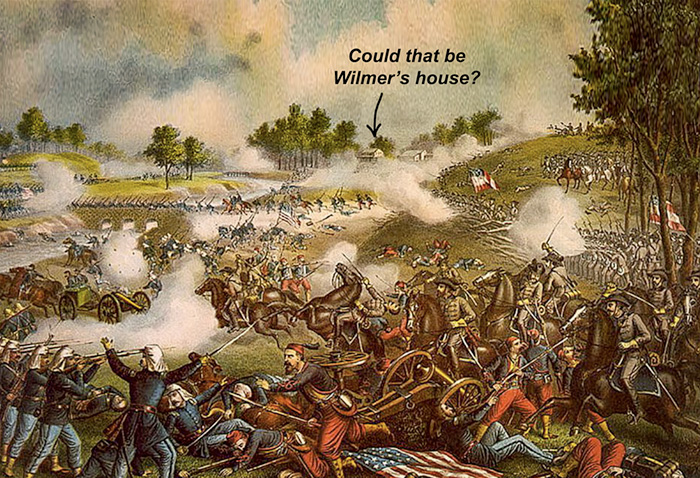_________________________
Today’s blog is brought to you by Guest Blogger, Linda Stowe. A big thanks to Linda for this!
_________________________
Trying to Outrun the Devil
By Linda Stowe
Historians have agreed that the American Civil War began on July 21, 1861, but there is some disagreement about the name of the first battle. The Union forces called it The First Battle of Bull Run after the stream that ran through the battlefield. It is surmised that the Union forces, being mostly from cities and towns, remember the area for its natural features; namely, that stream. The Confederate forces, being from more rural areas and used to natural surroundings, named it the First Battle of Manassas, after the closest town.
This battle was also known as the “picnic battle” because spectators showed up with picnic baskets and opera glasses. The Battle was fought just 30 miles from Washington, DC, allowing politicians to view the battle of the war first-hand. However, the battle lasted for 90 days and became so bloody, it is unlikely that the audience stayed very long.
Union forces were slow to position themselves, giving Confederate forces time to gather reinforcements. The Union army, numbering more than 28,000 soldiers, reported 460 killed, 1,124 wounded, and more than 1,300 listed as missing or captured. The Confederates, who outnumbered the Union side with more than 32,000 soldiers, reported significantly fewer casualties. They reported 387 killed, 1,582 wounded, and just 13 reported missing or captured.
This being the first big battle, each side had poorly trained and poorly led soldiers. This first bloody battle resulted in a Confederate victory followed by a disorganized retreat of Union forces.
This famous battle was significant on a personal level for Wilmer McLean because it took place on his farm, the Yorkshire Plantation. Confederate forces had commandeered McLean’s house as their headquarters, where at one point, a Union-fired cannonball hit the home and landed in the kitchen fireplace during dinner.
McLean was a farmer and wholesale grocer who had retired from the Virginia militia. At age 47, he was too old to be conscripted to fight, and he wanted no part of this war. After the battle, McLean moved his family 140 miles south to Appomattox, Virginia, to escape the war, thinking they would be safe. From his new home in central Virginia, McLean continued life as a merchant, primarily dealing in sugar.
On April 9, 1865, the Civil War revisited McLean because a suitable site was needed for Confederate General Robert E. Lee to officially surrender to Union General Ulysses S. Grant. McLean’s mansion was the nicest home near Appomattox Court House, where it was agreed the surrender would take place.
McLean reluctantly agreed to open his home, and Lee surrendered to Grant in the parlor of McLean’s home. McLean is reported to have said, “The war began in my front yard and ended in my front parlor.”
But McLean’s misfortune did not end there. As soon as the papers were signed, soldiers from the Union forces began looting the place, taking tables, chairs, and other furnishings as souvenirs.
THE FOLLOWING IS LIFTED FROM THE INTERNET:
“
Once the ceremony was over, members of the Army of the Potomac began taking the tables, chairs, and various other furnishings in the house — essentially, anything that was not tied down — as souvenirs. They simply handed money to the protesting McLean as they made off with his property.
Major General Edward Ord paid $40 for the table Lee had used to sign the surrender document, while Major General Philip Sheridan took the table on which Grant had drafted the document for $20 in gold. Sheridan then asked George Armstrong Custer to carry it away on his horse. The table was presented to Custer’s wife and is now on exhibit at the American History Museum at the Smithsonian.
“
After the war, McLean and his family sold their house in 1867, unable to keep up the mortgage payments, and returned to their home in Manassas. They later moved to Alexandria, Virginia. He worked for the Internal Revenue Service from 1873 to 1876. Wilmer McLean died in Alexandria and is buried there at St. Paul’s Episcopal Cemetery.
So, in a most unusual twist of fate, the Civil War started in McLean’s backyard in 1861 and ended in his parlor in 1865.
Polly note: I always think it is interesting in my own life when things come full circle. Of course, the “happenings” are not as huge and impactful as the Civil War of the United States of America. But little things. Sometimes, everyday things happen around.
And when the circle finally meets itself, when the beginning and the end finally join together, making one infinite loop, I am reminded of the infinity of our Universe, and I am filled with wonder and awe.
===========
“The wheel is come full circle.”
— William Shakespeare
============
“Life is a full circle, widening until it joins the circle motions of the infinite.”
— Anais Nin
============
“This is not a full circle. It’s life carrying on. It’s the next breath we all take. It’s the choice we make to get on with it.”
— Alexandra Fuller
============
